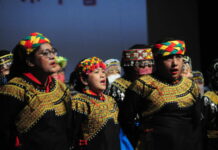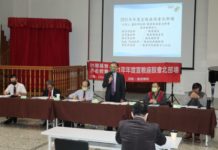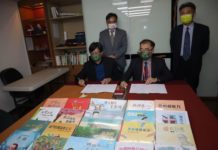December 12-18, 2011
General Assembly News
PCT responds to Chu Hung-yuan’s report on 228 Massacre
Reported by Sam Lee
Written by Lydia Ma
On December 12, 2011, The China Times ran an article indicating that a new report on the 228 Massacre written by Chu Hung-yuan, a research fellow at Academia Sinica, singled out the PCT for conspiring with hoodlums, Taiwanese-Japanese soldiers, and underground Chinese Communist Party members in inciting an insurrection during the 228 Massacre.
In response to this allegation, PCT General Secretary Andrew Chang exclaimed, “This is a serious insult to the PCT!” He also said that it is evident from Chu Hung-yuan’s report, which has yet to be made public, that the KMT is anything but sincere when apologizing for the 228 Massacre.
Chang underscored that two important factors to take into consideration when it comes to Chu’s report are the interpretation of historical events and the reliability of historical data. Since all PCT archives are public, the PCT will convene with scholars to study matters more closely before responding to these allegations.
According to a December 12, 2011 news report by The China Times, Chu and his team were given funding by the Taiwan Foundation for Democracy, whose current chairman is Legislative Speaker Wang Jin-pyng, to research the 228 Massacre. The research yielded a few new findings, one of which was that the PCT was also a culprit in this national tragedy. Chu reported that details about how the PCT became involved are still under investigation. He added that he had contacted Chang-Jung Senior High School on numerous occasions, but the school wouldn’t disclose any information related to this matter.
In response to this news report, Chang replied that various PCT members and pastors, including Tamkang High School Principal Chen Neng-tung, had perished in the 228 Massacre. To allege now that the PCT collaborated with thugs is a grave insult to the PCT.
PCT General Secretary Chang added that, just a few days ago, on Human Rights Day, President Ma had issued an apology for the government’s violation of human rights during the Martial Law era. But from this news story, it’s apparent that Chu’s report not only fails to evaluate the KMT’s role in this massacre but also hides the KMT’s wrongdoings and places the blame on the church.
Chang said it’s evident from this story that the KMT’s apology, issued by President Ma, is a façade for a political party that has yet to reflect seriously on its actions. Moreover, the fact that this story should make the news barely one month before the presidential elections is not only an affront to Taiwanese but also an emotional trauma as well, for this massacre has been used to fan ethnic and religious strife. Chang warned that if this story and Chu’s report were intended to be negative campaigns, the KMT’s ploy will backfire and it’ll wind up getting burned as well.
Responding to Chu’s assertion that he wasn’t able to secure documents for his research, the General Secretary said that all PCT historical documents and files are public. “There are no secrets because everything is recorded clearly!”
He underscored that Chang Jung High School is merely a museum. In other words, it is not the main location where all PCT historical documents are filed and stored. Almost all of the files are stored at the PCT Research and Development Center and they are also available at seminary libraries, a digital archive system at the National Central Library, Taiwan Church News, and Academia Sinica’s Institute of Taiwan History. Hence, for a scholar by trade like Chu to claim that the PCT wouldn’t disclose information not only reflects ignorance and sloppiness on his part, but also indicates that the credibility of his research deserves careful examination.
According to reports, to promote the R.O.C Centenary Celebrations, Chu has planned a series of speaking engagements in the U.S. on the theme of “The Christian Nature of the Chinese Revolution,” where he credits Christian values for the revolution and the founding of the R.O.C. Chu also believes the 228 Massacre is also pregnant with Christian undertones, only this time, an established Christian church in Taiwan, the PCT, collaborated with hoodlums to incite a rebellion.
That being said, Chang admits that the PCT did not participate or reach out enough during the 228 Massacre. As a result, it was after much introspection that the PCT issued a statement and an apology in February of 1990 and began promoting 228 remembrance movements and theological reflections. The PCT believes that what happened during the 228 Massacre can be forgiven, but should never be forgotten.
Speaking as a historian, Taiwan Theological College and Seminary history professor Rev. Cheng Yang-en said that Chu’s statements are a matter of interpreting history based on existing convictions and viewpoints. Moreover, Cheng notes that both the Revolution of 1911 and the 228 Massacre are instances of people rising up against tyranny. The fact that the former would be viewed favorably while the latter would be viewed negatively is indeed a matter of historical interpretation. Hence, Cheng advised the General Assembly to go over Chu’s report with Taiwanese historians so as to provide a detailed answer to each of Chu’s arguments.
From the General Secretary’s point of view, the fact that Chu would publish a report painting the PCT as a villain in the 228 Massacre so soon after the PCT issued a public statement on the current political situation in Taiwan and staged a pastoral prayer rally in front of the Presidential Palace is indeed worth pondering upon deeply.
Editor’s Note: This article previously cited “The China Post” as the newspaper that published Chu’s story. The correct name of the newspaper should be “China Times”. Corrections have been made accordingly.






